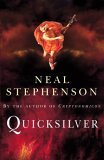
Unlike most of Stephenson's earlier works, the Cycle is set in the past, during the 17th and early 18th century, when the world was moving from one dominated by religion and aristocracy to one driven by science and economics. The characters include most of the prominent members of the Royal Society (Isaac Newton, Robert Boyle, Robert Hooke, etc.), Louis XIV of France, William I of Orange and James II of England. The fictional ones include vagabond Jack "Half-Cocked" Shaftoe, Eliza, a former harem slave turned duchess, and a smart but underachieving member of the Royal Society named Daniel Waterhouse. The action moves through India, North and South America, Europe and North Africa. A reviewer for the Telegraph put it best: you don't just read the Baroque Cycle, you move in and raise a family.
Like all good science fiction, the tension in Stephenson's stories comes not from prediction, but from responding to dramatic or catastrophic shifts in perception. That's why Jules Verne or H.G. Wells novels remain good reads, even if little of what they say have or will occur. It's about contemporary humans confronting a new world, one where the old rules no longer apply, and they must adapt.
The Cycle is about a time when almost all modern concepts in science, such as physics, computing and cryptography, first crop up, even if the inventors didn't yet have the resources (i.e., engines) to put all of them into practical use. At the same time, politics was being transformed by the rising power of the "Mobb," the common man, and nations were beginning to grasp the power of currencies and international trade. Battles were still fought with guns and swords, and obviously will continue to be, but economic warfare was already becoming crucial. A smart investor with some cash could bring down a government, then as now. Those several decades were the historical equivalent of a perfect storm.
Half the fun of reading such a novel is to put myself in some of the characters' places and imagine how I would respond, whether I would recognize the changes in time, or know how to take advantage of them. With Stephenson's story, we know what happens next. It took another 200 years before economists understood fully that money is a confidence trick. It isn't based on gold, but on the belief that a nation can generate the wealth to back it up. And we're still grappling with the implications of our understanding of the universe, and our relatively minor role in it.
We're also living in interesting times now: We have all of the world's knowledge at our fingertips. Anyone can write, film or record something and have it instantly read or viewed by a billion people. And, on the negative side, any tin-pot nut case can acquire the know-how to kill thousands. I wonder how long it will take us to fully grasp today's changes?
